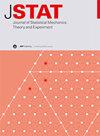随机图的最小连接支配集和骨干图
IF 1.9
3区 物理与天体物理
Q2 MECHANICS
Journal of Statistical Mechanics: Theory and Experiment
Pub Date : 2024-06-07
DOI:10.1088/1742-5468/ad4026
引用次数: 0
摘要
我们研究的最小支配集问题是一个具有代表性的组合优化难题,它具有全局拓扑约束。支配集的顶点所引起的主干应该是一个连通的子图,这一要求使得用统计物理方法研究这个问题变得相当不容易。在这里,我们将这种全局连通性约束转换成一组局部顶点约束,并建立了一个只有五个粗粒度顶点状态的自旋玻璃模型。我们推导出一组粗粒度信念传播方程,并获得了常规随机图集和埃尔德斯-雷尼随机图集最小支配集相对大小的理论预测。我们还实现了一种高效的信息传递算法,为单个随机图实例构建接近最小连接的支配集和骨干子图。我们的理论策略也可能适用于其他一些全局拓扑约束。本文章由计算机程序翻译,如有差异,请以英文原文为准。
Minimum connected dominating set and backbone of a random graph
We study the minimum dominating set problem as a representative combinatorial optimization challenge with a global topological constraint. The requirement that the backbone induced by the vertices of a dominating set should be a connected subgraph makes the problem rather nontrivial to investigate by statistical physics methods. Here, we convert this global connectivity constraint into a set of local vertex constraints and build a spin glass model with only five coarse-grained vertex states. We derive a set of coarse-grained belief-propagation equations and obtain theoretical predictions of the relative sizes of the minimum dominating sets for regular random and Erdös–Rényi random graph ensembles. We also implement an efficient message-passing algorithm to construct close-to-minimum connected dominating sets and backbone subgraphs for single random graph instances. Our theoretical strategy may also be applicable to some other global topological constraints.
求助全文
通过发布文献求助,成功后即可免费获取论文全文。
去求助
来源期刊
CiteScore
4.50
自引率
12.50%
发文量
210
审稿时长
1.0 months
期刊介绍:
JSTAT is targeted to a broad community interested in different aspects of statistical physics, which are roughly defined by the fields represented in the conferences called ''Statistical Physics''. Submissions from experimentalists working on all the topics which have some ''connection to statistical physics are also strongly encouraged.
The journal covers different topics which correspond to the following keyword sections.
1. Quantum statistical physics, condensed matter, integrable systems
Scientific Directors: Eduardo Fradkin and Giuseppe Mussardo
2. Classical statistical mechanics, equilibrium and non-equilibrium
Scientific Directors: David Mukamel, Matteo Marsili and Giuseppe Mussardo
3. Disordered systems, classical and quantum
Scientific Directors: Eduardo Fradkin and Riccardo Zecchina
4. Interdisciplinary statistical mechanics
Scientific Directors: Matteo Marsili and Riccardo Zecchina
5. Biological modelling and information
Scientific Directors: Matteo Marsili, William Bialek and Riccardo Zecchina

 求助内容:
求助内容: 应助结果提醒方式:
应助结果提醒方式:


